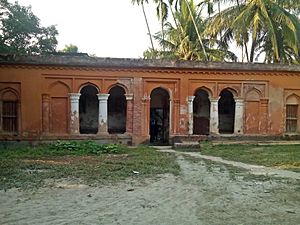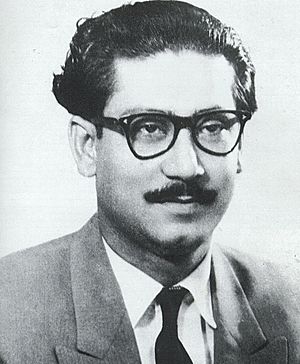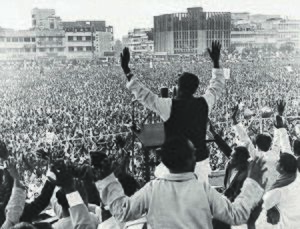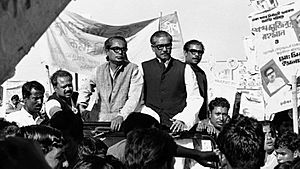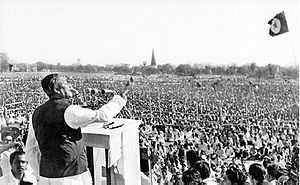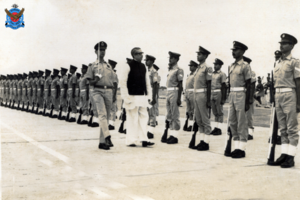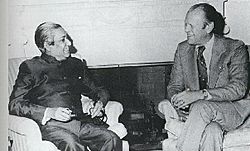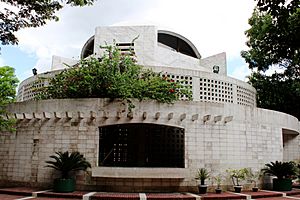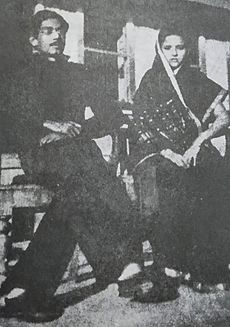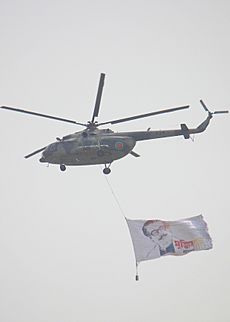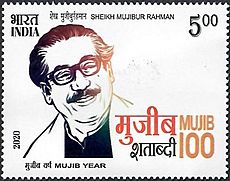Sheikh Mujibur Rahman facts for kids
Quick facts for kids
Sheikh Mujibur Rahman
|
|||||||||||||||||||||||||||||||||||||||||||||||||||||||||||||||||||||||||
|---|---|---|---|---|---|---|---|---|---|---|---|---|---|---|---|---|---|---|---|---|---|---|---|---|---|---|---|---|---|---|---|---|---|---|---|---|---|---|---|---|---|---|---|---|---|---|---|---|---|---|---|---|---|---|---|---|---|---|---|---|---|---|---|---|---|---|---|---|---|---|---|---|---|
| শেখ মুজিবুর রহমান | |||||||||||||||||||||||||||||||||||||||||||||||||||||||||||||||||||||||||
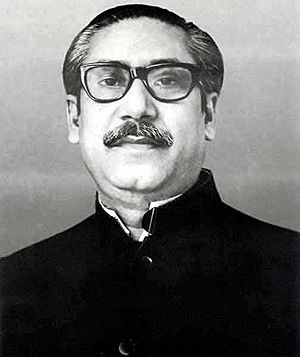
Official portrait, 1971
|
|||||||||||||||||||||||||||||||||||||||||||||||||||||||||||||||||||||||||
| President of Bangladesh | |||||||||||||||||||||||||||||||||||||||||||||||||||||||||||||||||||||||||
| In office 25 January 1975 – 15 August 1975 |
|||||||||||||||||||||||||||||||||||||||||||||||||||||||||||||||||||||||||
| Prime Minister | Muhammad Mansur Ali | ||||||||||||||||||||||||||||||||||||||||||||||||||||||||||||||||||||||||
| Preceded by | Mohammad Mohammadullah | ||||||||||||||||||||||||||||||||||||||||||||||||||||||||||||||||||||||||
| Succeeded by | Khondaker Mostaq Ahmad (Usurper) | ||||||||||||||||||||||||||||||||||||||||||||||||||||||||||||||||||||||||
| Member of Jatiya Sangsad | |||||||||||||||||||||||||||||||||||||||||||||||||||||||||||||||||||||||||
| In office 7 March 1972 – 15 August 1975 |
|||||||||||||||||||||||||||||||||||||||||||||||||||||||||||||||||||||||||
| Preceded by | Constituency established | ||||||||||||||||||||||||||||||||||||||||||||||||||||||||||||||||||||||||
| Succeeded by | Jahangir Mohammad Adel | ||||||||||||||||||||||||||||||||||||||||||||||||||||||||||||||||||||||||
| Constituency | Dhaka-12 | ||||||||||||||||||||||||||||||||||||||||||||||||||||||||||||||||||||||||
| Prime Minister of Bangladesh | |||||||||||||||||||||||||||||||||||||||||||||||||||||||||||||||||||||||||
| In office 12 January 1972 – 24 January 1975 |
|||||||||||||||||||||||||||||||||||||||||||||||||||||||||||||||||||||||||
| President |
|
||||||||||||||||||||||||||||||||||||||||||||||||||||||||||||||||||||||||
| Preceded by | Tajuddin Ahmad | ||||||||||||||||||||||||||||||||||||||||||||||||||||||||||||||||||||||||
| Succeeded by | Muhammad Mansur Ali | ||||||||||||||||||||||||||||||||||||||||||||||||||||||||||||||||||||||||
| President of Bangladesh Awami League | |||||||||||||||||||||||||||||||||||||||||||||||||||||||||||||||||||||||||
| In office 1972–1974 |
|||||||||||||||||||||||||||||||||||||||||||||||||||||||||||||||||||||||||
| Preceded by | Position established | ||||||||||||||||||||||||||||||||||||||||||||||||||||||||||||||||||||||||
| Succeeded by | Abul Hasnat Muhammad Qamaruzzaman | ||||||||||||||||||||||||||||||||||||||||||||||||||||||||||||||||||||||||
|
|||||||||||||||||||||||||||||||||||||||||||||||||||||||||||||||||||||||||
| Personal details | |||||||||||||||||||||||||||||||||||||||||||||||||||||||||||||||||||||||||
| Born | 17 March 1920 Tungipara, Faridpur District, Bengal, British India |
||||||||||||||||||||||||||||||||||||||||||||||||||||||||||||||||||||||||
| Died | 15 August 1975 (aged 55) Dacca, Bangladesh |
||||||||||||||||||||||||||||||||||||||||||||||||||||||||||||||||||||||||
| Cause of death | Assassination | ||||||||||||||||||||||||||||||||||||||||||||||||||||||||||||||||||||||||
| Resting place | Mausoleum of Sheikh Mujibur Rahman | ||||||||||||||||||||||||||||||||||||||||||||||||||||||||||||||||||||||||
| Nationality |
|
||||||||||||||||||||||||||||||||||||||||||||||||||||||||||||||||||||||||
| Political party | Bangladesh Krishak Sramik Awami League (1975) | ||||||||||||||||||||||||||||||||||||||||||||||||||||||||||||||||||||||||
| Other political affiliations |
|
||||||||||||||||||||||||||||||||||||||||||||||||||||||||||||||||||||||||
| Spouse | Begum Fazilatunnesa | ||||||||||||||||||||||||||||||||||||||||||||||||||||||||||||||||||||||||
| Children |
|
||||||||||||||||||||||||||||||||||||||||||||||||||||||||||||||||||||||||
| Parents |
|
||||||||||||||||||||||||||||||||||||||||||||||||||||||||||||||||||||||||
| Relatives | Sheikh–Wazed family | ||||||||||||||||||||||||||||||||||||||||||||||||||||||||||||||||||||||||
| Residence | Dhanmondi 32 | ||||||||||||||||||||||||||||||||||||||||||||||||||||||||||||||||||||||||
| Alma mater |
|
||||||||||||||||||||||||||||||||||||||||||||||||||||||||||||||||||||||||
| Occupation |
|
||||||||||||||||||||||||||||||||||||||||||||||||||||||||||||||||||||||||
| Signature | |||||||||||||||||||||||||||||||||||||||||||||||||||||||||||||||||||||||||
| Nickname | Khoka | ||||||||||||||||||||||||||||||||||||||||||||||||||||||||||||||||||||||||
Sheikh Mujibur Rahman (Bengali: শেখ মুজিবুর রহমান; 17 March 1920 – 15 August 1975) was a very important leader in Bangladesh. People often called him Sheikh Mujib or Mujib. He was also widely known as Bangabandhu, which means "Friend of Bengal".
He was a politician and a statesman, meaning he was skilled in government. He was the founding leader of the People's Republic of Bangladesh. He served as the first President of the Provisional Government of Bangladesh from April 1971 to January 1972. Then, he became the Prime Minister of Bangladesh from January 1972 to January 1975. Finally, he served as President again from January 1975 until his death in August 1975. In 2011, Bangladesh's constitution officially called him the Father of the Nation.
Mujib started as a student activist in Bengal when India was still under British rule. He became a strong speaker in the Awami League party. He was popular because he spoke out against unfair treatment of Bengalis in Pakistan. Bengalis were the largest group in Pakistan. He was first elected to public office in 1954. He worked to make sure Bengali identity was respected in Pakistan's constitution.
As tensions grew between East Pakistan (now Bangladesh) and West Pakistan, Mujib proposed a six-point plan for more self-rule. He was often put in jail for protesting against the Pakistani government. In 1970, Mujib led the Awami League to win Pakistan's first democratic election. Even though his party won most votes, the military rulers did not let them form a government.
This led to widespread protests in East Pakistan. Mujib gave a famous speech on 7 March 1971, hinting at Bangladesh's independence. On 26 March 1971, he declared Bangladesh's independence. This happened after the Pakistan Army started a harsh crackdown called Operation Searchlight. Mujib was arrested and taken to West Pakistan. Meanwhile, the Bengali people faced terrible violence. A nine-month war was fought in his name. Pakistan surrendered on 16 December 1971. Mujib was released from Pakistani custody and returned home on 10 January 1972. People in Bangladesh were very happy about winning the war and Mujib's return. However, the new country faced many challenges.
Sheikh Mujib was a major leader in the 20th century. He helped create the Constitution of Bangladesh within a year of independence. He also helped change East Pakistan's government, army, and courts into those of an independent Bangladesh. In 1974, he gave the first speech in Bengali at the UN General Assembly. His time as leader was the only period when Bangladesh had a socialist government. In 1975, he set up a one-party system, which lasted seven months until his death.
His legacy is still debated in Bangladesh. Some criticize his economic policies and the Bangladesh famine of 1974. However, most Bangladeshis praise him for leading the country to independence in 1971. Many people in and outside Bangladesh respectfully call him Bangabandhu. In a 2004 BBC poll, Mujib was voted the Greatest Bengali of all time. His 7 March speech is recognized by UNESCO. His diaries and travel stories were published after his death.
Contents
Early Life and His Start in Politics
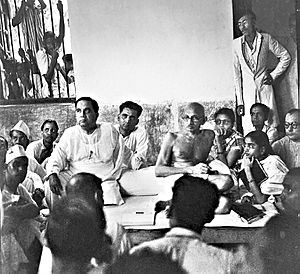
Sheikh Mujibur Rahman was born in 1920 in a village called Tungipara. This village was in the Bengal province of British India. His father, Sheikh Lutfur Rahman, worked as a law clerk. His mother, Sayera Khatun, was a housewife. They were a middle-class Muslim family. Mujib was the third of six children. His parents called him "Khoka" as a nickname.
In 1927, Mujib started school. He later moved to different schools. In 1934, he had to leave school for four years because of eye surgery. He started showing signs of being a leader around this time. A political leader named Huseyn Shaheed Suhrawardy noticed Mujib's passion for politics. Mujib finished school in 1942.
He then moved to Calcutta (now Kolkata) for college. Calcutta was the capital of British Bengal and a very big city. He studied political science at Islamia College. He earned his bachelor's degree in 1947.
While in Calcutta, Mujib joined the Bengal Provincial Muslim League. He also got involved in the movement for India's independence and the creation of Pakistan. In 1943, he became a councilor of the Muslim League. In 1946, he was elected General Secretary of the Islamia College Students Union. His political teacher, Suhrawardy, led a group within the Muslim League. Mujib helped Suhrawardy organize workers' unions. He also helped protect Muslim families during violent times before India was divided.
After India was divided in 1947, Mujib studied law at the University of Dhaka. In 1948, he started the Muslim Students League. This group later became the Bangladesh Chhatra League. When Pakistan's Governor General, Muhammad Ali Jinnah, visited Dhaka, he said that Urdu would be the only national language of Pakistan. This started the Bengali Language Movement. Mujib joined this movement. He was arrested many times for his political activities. In 1949, he was even kicked out of Dhaka University for encouraging protests. However, in 2010, the university officially cancelled that expulsion.
Becoming a Leader in Pakistan
Mujib became a very important opposition leader in Pakistan from 1948 to 1971. He spoke for the ordinary Bengali people. He was good at remembering people's names. He was often jailed for leading protests against the Pakistani government. The government watched him closely and accused him of trying to separate East Pakistan from West Pakistan.
Forming the Awami League Party
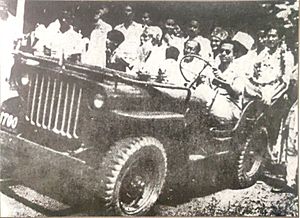
The All Pakistan Awami Muslim League party was started on 23 June 1949. Sheikh Mujib was chosen as one of its joint secretaries. Later, the word "Muslim" was removed from the party's name. This was done so the party could represent all people, including Hindus and Christians. Suhrawardy joined the party later and became its main leader. He relied on Mujib to organize political activities in East Bengal.
Mujib became Suhrawardy's student in politics. Suhrawardy wanted Pakistan to stay united but with a federal system. Mujib, however, supported more self-rule for East Bengal and was open to the idea of independence. Mujib took strong control of the party in East Bengal. The Awami League became a center-left party.
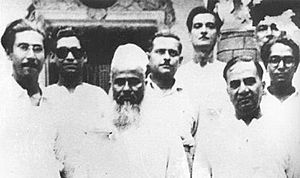
Supporting the Language Movement
The Awami League strongly supported the Bengali Language Movement. Bengalis believed their language should be a national language alongside Urdu. This was because Bengalis were the largest ethnic group in Pakistan. Mujib helped create the All-Party State Language Action Committee. He was arrested many times during this movement.
In 1952, Pakistan's Prime Minister said Urdu would be the only state language. Even from jail, Mujib helped organize protests. He played a key role in making 21 February 1952 a strike day. Mujib himself went on a hunger strike for 13 days. He was released from jail on 26 February. This happened after police killed protestors on 21 February, which caused public anger.
Joining the United Front Government
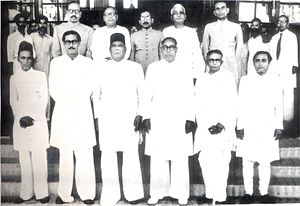
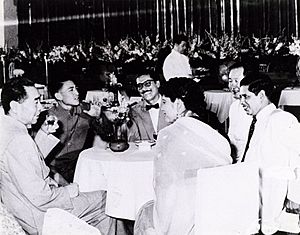
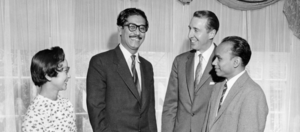
The Awami League joined with other parties to form the United Front coalition. In 1954, Mujib was elected to public office for the first time. He became a member of the East Bengal Legislative Assembly. The United Front won a huge victory. A. K. Fazlul Huq became Chief Minister, and Mujib was made a minister for agriculture and forestry. However, this government was dismissed quickly, and Mujib was arrested again. He was released later that year.
In 1955, Mujib was elected to Pakistan's Constituent Assembly. He spoke strongly for East Pakistan's rights. He opposed changing East Bengal's name to East Pakistan. He later became the provincial minister for commerce and industries. This helped him become even more popular with workers. In 1956, the new constitution declared Urdu, Bengali, and English as national languages.
In 1957, Mujib visited China. In 1958, he visited the United States. He then left his minister job to work full-time for the Awami League. His mentor, Suhrawardy, became Pakistan's Prime Minister. Suhrawardy improved Pakistan's ties with the US and China.
In 1958, the military took over Pakistan. General Ayub Khan became the dictator. Many politicians, including Suhrawardy, were jailed. A new constitution was introduced that limited people's voting rights. Mujib joined an insurance company in 1960 and worked there for many years.
The Six-Point Plan for Self-Rule
After Suhrawardy's death in 1963, Mujib became the General Secretary of the Awami League. He was a key leader against President Ayub Khan's rule. Ayub Khan had a system called "Basic Democracy" which limited who could vote. Mujib supported Fatima Jinnah against Ayub Khan in the 1965 presidential election. Fatima Jinnah was the sister of Pakistan's founder. She attracted huge crowds in East Pakistan.
East Pakistan was where most of the opposition to Ayub Khan was. Mujib became popular for speaking about the unfair treatment of Bengalis. For example, Bengalis were not well-represented in the military. Even though East Pakistan earned most of Pakistan's money from exports, it received less money in the budget than West Pakistan.
In 1966, Mujib presented a six-point plan at a meeting in Lahore. Lahore was chosen because of its history. The six points called for:
- Ending the "Basic Democracy" system.
- Bringing back full voting rights for everyone.
- Giving more power to the provinces of East and West Pakistan.
- Having separate money and trade policies for East and West Pakistan.
- Increasing security spending for East Pakistan.
Mujib's plan gained huge support in East Pakistan. It became known as the 6-point movement. This movement was a major step towards East and West Pakistan becoming two separate nations. Mujib became the President of the Awami League in 1966.
The Agartala Conspiracy Case
Mujib was arrested by the Pakistan Army. After two years in jail, he was put on trial in a military court. This trial was known as the Agartala Conspiracy Case. Mujib and 34 Bengali military officers were accused of working with Indian agents to break up Pakistan. The government claimed the plan was made in Agartala, India.
People in East Pakistan were very angry about Mujib's arrest. There were large protests and strikes. Many groups added more demands, forming an "11-point plan." The government finally gave in to the pressure. They dropped the charges on 22 February 1969 and released Mujib the next day. He returned to East Pakistan as a hero. On 23 February, he was given the honorary title Bangabandhu by Tofail Ahmed. Bangabandhu means Friend of Bengal.
Meeting with Leaders
In 1969, President Ayub Khan held a meeting with opposition parties to solve the political problems. Mujib attended this meeting. He wanted to get more self-rule for East Pakistan. Mujib was the most powerful opposition leader there. He told British media that "East Pakistan must get full regional autonomy." He also said that West Pakistanis supported these demands, and only a few powerful people wanted to divide East and West Pakistan.
After the meeting, Mujib traveled to cities in West Pakistan. Crowds cheered for him. He spoke to them in Urdu, explaining his "six points." When he returned to Dhaka, he said that East Pakistan should be called Bangladesh.
Mujib's strong speeches made Bengalis feel proud of their identity. Many started to want independence for Bangladesh. He became one of the most powerful political figures in the region. Bengalis increasingly called him Bangabandhu.
The 1970 Election
Before the 1970 election, a very strong cyclone hit East Pakistan. Half a million people died, and millions lost their homes. The military government was slow to help. Newspapers in East Pakistan criticized the government for not caring. Mujib said, "We have a large army but it is left to the British Marines to bury our dead." This made Bengalis very angry.
In the election held on 7 December 1970, the Awami League won almost all the seats in East Pakistan. They won 167 out of 169 seats in the National Assembly of Pakistan. This made the Awami League the largest party in the whole country. Sheikh Mujib was expected to become the Prime Minister. However, the second-largest party, led by Zulfikar Ali Bhutto, refused to let Mujib form a government.
The new parliament was supposed to meet in Dhaka. But President Yahya Khan postponed the meeting. This caused a huge uprising in East Pakistan.
Bangladesh Becomes Independent
Civil Disobedience and Protests
When the parliament meeting was postponed, people in East Pakistan protested. Cities like Dhaka and Chittagong were filled with demonstrations. On 7 March 1971, Mujib gave a historic speech at the Ramna Race Course Maidan. He talked about Pakistan's history and how Bengalis were denied their rights. He said that the Awami League would work for independence. He told people to "turn every house into a fortress."
After this speech, a period of civil disobedience began. The Awami League started collecting taxes. All money transfers to West Pakistan were stopped. The Awami League took control of East Pakistan. On 23 March 1971, Bangladeshi flags were flown everywhere as a sign of resistance. The Awami League and Pakistani military leaders continued talks. But West Pakistani troops and weapons were secretly being brought into East Pakistan. The military was getting ready for a crackdown.
The War Begins
Talks failed on 25 March 1971. Yahya Khan left Dhaka, declared martial law, banned the Awami League, and ordered the Pakistan Army to arrest Mujib. The Pakistan Army launched Operation Searchlight. Mujib sent messages to Chittagong, where others announced Bangladesh's independence on his behalf.
Soon after declaring independence, Mujib was arrested. He was flown to a jail in West Pakistan and kept alone. Many other Awami League leaders escaped to India. The Pakistan Army carried out terrible acts against Bengali civilians. This was widely called a genocide. Many Hindus fled to India. Bengali army and police groups revolted. Awami League leaders formed the Provisional Government of Bangladesh. A major fight for freedom, led by the Mukti Bahini, started across East Pakistan.
Despite international pressure, Pakistan refused to release Mujib. Mujib's family was kept under house arrest. After India joined the war in December, the Pakistan Army surrendered.
Mujib's Return Home
After the war, Zulfikar Ali Bhutto became Pakistan's President. Due to international pressure, he released Mujib on 8 January 1972. Mujib was flown to London. In London, he was welcomed by British officials and met with British Prime Minister Edward Heath. Mujib then held a press conference.
The British government gave Mujib an RAF plane to fly him back to independent Bangladesh. He stopped in New Delhi, India, where he was welcomed by Indian President V. V. Giri and Prime Minister Indira Gandhi. Mujib thanked India for its help.
After a few hours in Delhi, Mujib flew to Dhaka. Millions of people gathered at Tejgaon Airport to greet him. His return was described as a huge emotional celebration. Mujib was given a guard of honor by the new Bangladeshi armed forces. He was driven in an open truck through the crowds to the Ramna Race Course, where he had given his famous speech ten months earlier.
Leading Bangladesh
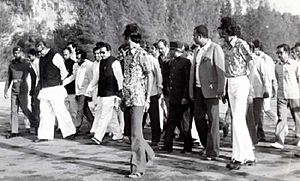
Mujib first became the temporary president, then the prime minister. In January 1972, Time magazine reported that many cities in Bangladesh looked like they had been hit by a nuclear attack. Millions of homes were destroyed. Transportation and communication systems were broken. Businesses had sent their money to West Pakistan.
The new government quickly changed East Pakistan's old government system into an independent Bangladeshi one. They created the Supreme Court of Bangladesh. The Awami League wrote a written constitution and helped war victims. In January 1972, Mujib made Bangladesh a parliamentary republic. This meant the Prime Minister had the most power. The constitution was adopted on 4 November 1972, which was very fast compared to Pakistan's process.
Mujib also helped people who were displaced by the war. He created a fund to help about 10 million people who returned from India. He opened many new primary schools and made 40,000 existing ones government-owned.
Indian Troops Leave Bangladesh
One of Mujib's first goals was to have Indian troops leave Bangladesh. He asked India to remove its military forces quickly. The troops left within three months of Pakistan's surrender. A ceremony was held in Dhaka on 12 March 1972. Many countries then started diplomatic relations with Bangladesh.
Economic Policies and Challenges
Mujib declared socialism as a national policy. This meant the government would control many parts of the economy. He limited how much land people could own. He made all banks, insurance companies, and 580 factories government-owned. There was little foreign investment.
The Mujib government faced big problems. They had to resettle millions of people and provide food and health services. The economy was very bad because of the war and the 1970 cyclone. In 1974, a famine occurred. The price of rice went up sharply, and many people starved. Many of Mujib's socialist policies were later changed by future governments.
Secularism and Foreign Relations
Bangladesh became the first country in South Asia to have "secularism" in its constitution in 1972. This meant the government would not favor any religion. However, Mujib also banned some "anti-Islamic" activities. He created the Islamic Foundation Bangladesh to manage religious affairs for Muslims. In 1974, Bangladesh joined the Organization of the Islamic Conference (OIC), a group of Muslim-majority countries.
Mujib's main success in foreign policy was getting most countries to recognize Bangladesh. Bangladesh joined the Commonwealth, the UN, the OIC, and the Non-Aligned Movement. His friends included Prime Minister Indira Gandhi of India and Marshal Tito of Yugoslavia. In 1974, Mujib gave a historic speech in Bengali at the United Nations General Assembly. This was the first time Bengali was spoken there. He talked about Bangladesh's desire for peace and justice.
Mujib and Indira Gandhi signed a 25-year friendship treaty. India also gave a lot of economic help to Bangladesh. In 1974, Bangladesh, India, and Pakistan agreed to work for peace in the region. Japan also became a major helper to Bangladesh. Mujib met Queen Elizabeth II at Commonwealth meetings.
One-Party System
In 1975, Mujib's political ideas changed. He felt there was growing unhappiness with his government. He changed the constitution, made himself president, and created a one party state. This meant only one political party was allowed. This party was called the Bangladesh Krishak Sramik Awami League (BAKSAL). Government workers and military officers were told to join this party. This decision is still debated today. The one-party system lasted for seven months until Mujib's death.
His Death
Sheikh Mujibur Rahman was killed along with most of his family at his home on 15 August 1975. This happened during a military coup by some army officers. His wife, three sons, two daughters-in-law, and other relatives and staff were killed. After the coup, four other leaders of the former Provisional Government were arrested and later killed.
His Family
Mujib married Fazilatunnesa when he was 18. They had two daughters, Sheikh Hasina and Sheikh Rehana, and three sons, Sheikh Kamal, Sheikh Jamal, and Sheikh Russel. During the Bangladesh Liberation War, Kamal helped organize the freedom fighters. Jamal trained at a military academy in Great Britain and joined the Bangladesh Army.
Almost the entire Sheikh family was killed on 15 August 1975. Only Sheikh Hasina and Sheikh Rehana survived because they were visiting West Germany at the time. Mujib's grandson, Sajeeb Wazed, is a prominent figure today. His granddaughter, Tulip Siddiq, is a British Member of Parliament.
His Legacy
In 2004, listeners of BBC Bangla radio voted Mujib as the Greatest Bengali of all time. He was ranked above famous figures like Rabindranath Tagore and Kazi Nazrul Islam. In 2011, the parliament of Bangladesh officially called Mujib the "Father of the Nation" in the country's constitution.
In 2020, Bangladesh celebrated Mujib Year to mark 100 years since his birth. This was before Bangladesh's 50th anniversary of independence in 2021. Mujib is still a very important figure in Bangladesh. His party, the Awami League, promotes his legacy. People who oppose the Awami League criticize his leadership style and the one-party system he created. However, his supporters and many Bangladeshis praise him for leading the country to independence.
Many roads, buildings, and places in Bangladesh are named after him. His picture is on the Bangladeshi currency. People often call him Bangabandhu out of respect. A satellite is also named after him.
Mujib is remembered in India as a friend. Streets in New Delhi and Kolkata are named after him. A street in Hebron, Palestine, and boulevards in Ankara, Turkey, and Port Louis, Mauritius, are also named in his honor.
People who met Mujib often described him as charming and powerful. One diplomat said he had "raw power" and could "mesmerize hundreds of thousands." He saw himself as representing the hopes of the Bengali people. Time magazine called him the "political Gandhi of the Bengalis."
A journalist from Egypt said, "Sheikh Mujibur Rahman does not belong to Bangladesh alone. He is the harbinger of freedom for all Bengalis." Fidel Castro, a Cuban leader, once said, "I have not seen the Himalayas. But I have seen Sheikh Mujib. In personality and in courage, this man is the Himalayas." Mujib himself mentioned leaders like Abraham Lincoln and Mao Zedong as inspirations.
Songs and Books About Mujib
- "Shono Ekti Mujiburer Theke" is a 1971 song about him. It inspired freedom fighters during the war.
- "Jodi Raat Pohale Shona Jeto" is another popular song about him from 1990.
- Humayun Ahmed included Sheikh Mujib in his novels Jochona O Jononir Golpo (2004) and Deyal (2012).
- In 2015, a four-part children's comic book series called Mujib was published. It was based on his autobiographies.
Films About Mujib
- In the 1974 Bangladeshi film Sangram, Sheikh Mujibur Rahman played himself.
- In the 2014 Indian film Children of War, an actor played Sheikh Mujib.
- The 2018 documentary Hasina: A Daughter's Tale features his daughter, Sheikh Hasina, talking about his death.
- Tungiparar Miya Bhai (2021) and Chironjeeb Mujib (2021) are biopics about him.
- Mujib Amar Pita (2021) is an animated film about Sheikh Mujibur Rahman.
- Mujib: The Making of a Nation (2021) is another biopic directed by Shyam Benegal.
Awards Received
| Prize Name | Year |
|---|---|
| Joliot-Curie Medal of Peace | 1973 |
| Independence Award | 2003 |
| Gandhi Peace Prize | 2020 |
See also
 In Spanish: Sheikh Mujibur Rahman para niños
In Spanish: Sheikh Mujibur Rahman para niños
 | Roy Wilkins |
 | John Lewis |
 | Linda Carol Brown |


